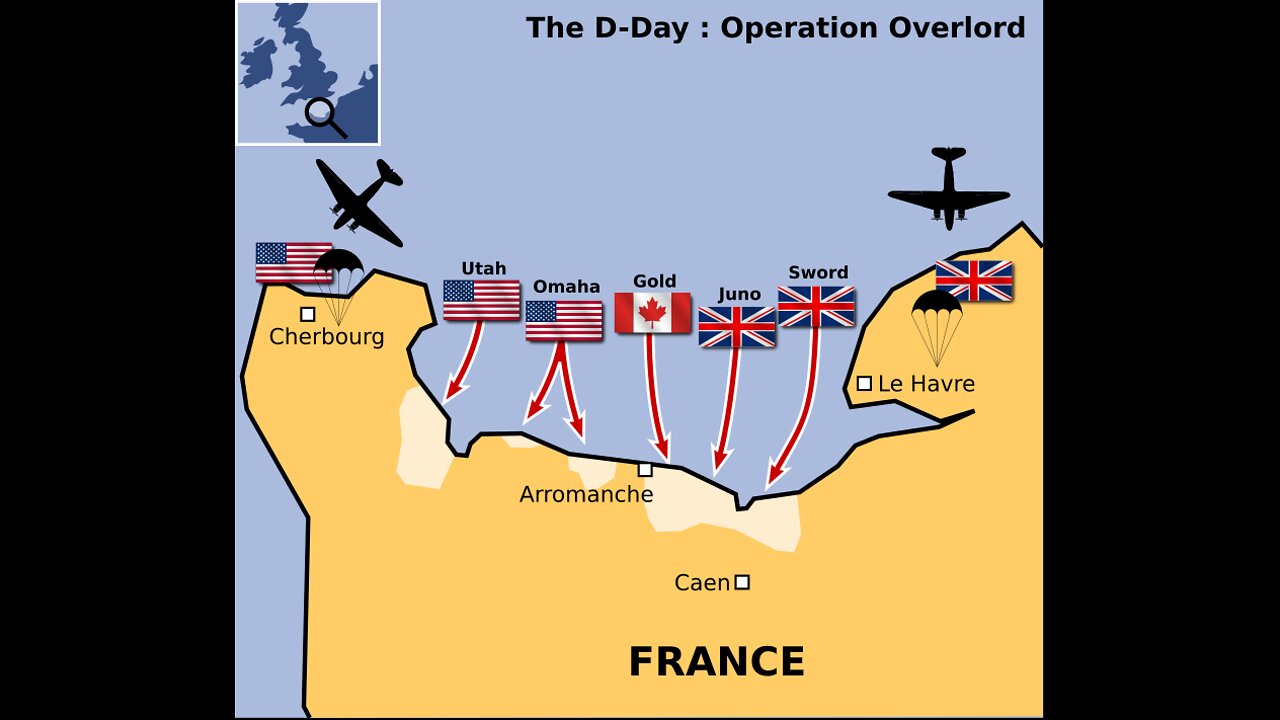Premium Only Content

D-Day 78 years later
D-Day 78 years later
By Terry A. Hurlbut
Today marks the 78th anniversary of Operation Overlord, which history commonly calls D-Day. On this day in 1944, more than 156,000 troops ran into withering machine-gun fire along a wide beach in Normandy. Thousands died, and thousands more took wounds. But those who survived, made possible the liberation of northwestern Europe.
How D-Day gets its name
NBC News gives the best example of the celebrations taking place in America and Europe. But from a Jacksonville, Florida TV station comes the best summary of the invasion, its price, and its reward.
In military talk, D-Day means the day of an operation, just as H-Hour means the time. In that sense, every military operation has its D-Day and H-Hour, telling when they begin.
But all agree that Operation Overlord was different. In fact it was the largest sea, land and air invasion in history. That’s likely not even counting the parachute drops into towns like Saint-Mer-Eglise the night before the invasion. 4,414 Allied soldiers, including 2,501 Americans, died that day. But the Allies prevailed for two reasons. First, the enemy’s “Atlantic Wall” had holes in it and often not enough troops to hold key points. Second – and no doubt Sun Tzu could have told them – one cannot withstand siege.
This year marks the first time in three years that Americans or Europeans have been able to celebrate in any great numbers.
Normandy residents still seem to remember D-Day and its participants quite fondly. Remarkably, many who took part in D-Day still live. But, biology being what it is, they can’t live much longer.
How will people remember D-Day when the last veteran who took part in the invasion has died? Will anyone care, 22 years from now, at the centennial of Operation Overlord? Only the younger of us can answer that.
Could we do it again?
The much larger question is: could the world ever see such an invasion again? Could the United States, with or without the allies it had, do a D-Day today?
Sadly, CNAV doubts it. Lay aside for a moment the kind of “celebrations” that also mark this month. In blunt fact, America has forgotten the civilizational virtues that produced the sort of men who could:
1. Ride a coffin-like boat onto a beach,
2. Watch a ramp drop to the sand in front of them,
3. Instantly take machine-gun fire that riddles some of their mates, dropping them to the deck, never to think again, and
4. In spite of that, rush into that same fire, counting every step as a minor victory.
The film The Longest Day (1962) did some justice to the invasion. Men falling to the beach at random, instantly dead, conveyed some small part of the toll. But no film captured what it meant to storm that beach better than 1998’s Saving Private Ryan. There, you see the ramp of the LCVP drop to the water. In the next instant: RAT-TAT-TAT-TAT-TAT-TAT-TAT-TAT-TAT! Of course some men fall on either side of you. But you have a job to do, so you jump forward and do it!
And the men is deliberate. Back then, women did not storm beaches – though some of them were on hand to help treat their wounds afterwards – if those men were lucky.
Looking forward
Organizations like the United Nations and World Economic Forum try to boast that they’ll make sure we don’t have to mount another D-Day. But CNAV still asks: what would happen if we had to?
Only a thorough reform of our education systems, and reversion to the education that produced brave fighting men, will help us answer, Yes, we can pull off another D-Day. And the help for that won’t come from the UN or the WEF. Nor will it come from the present administration or anyone allied with it.
Link to:
The article:
https://cnav.news/2022/06/06/news/d-day-78-years-later/
Conservative News and Views:
https://cnav.news/
The CNAV Store:
https://cnav.store/
BitNext:
https://bitnext.app/landing/
-
 19:47
19:47
Declarations of Truth
18 days agoElite university leftist bias provokes response
2046 -
 1:58:39
1:58:39
The Confessionals
2 days ago744: Inside the UAP Intel Loop
4.46K -
 1:04:01
1:04:01
Timcast
3 hours agoTrump Just NUKED Global Economy, Tariffs Ignite Trade War, Markets COLLAPSING
157K131 -
 1:54:08
1:54:08
Steven Crowder
5 hours agoLiberation Day: How Trump's Tariff Strategy will Reset the Global Order
354K209 -
 1:58:23
1:58:23
The Charlie Kirk Show
3 hours ago“Liberation Day” Reaction + Military Standards + Tariff History | Thibeau, Hanson | 4.3.25
74.1K13 -
 LIVE
LIVE
SternAmerican
1 day agoIntegrity in Action call With Steve Stern and Raj Doraisamy Thursday, April 3rd at 2:00PM EST
409 watching -
 1:39:41
1:39:41
Rebel News
2 hours ago $1.89 earnedTrumps new global tariffs, Poilievre and Carney respond, Tamara Lich verdict | Rebel Roundup
26.4K4 -
 1:06:19
1:06:19
TheAlecLaceShow
3 hours agoTrump Tariffs Take Effect | Alec Lace in the Rose Garden | Guest: Jim Pfaff | The Alec Lace Show
17.9K1 -
 LIVE
LIVE
Major League Fishing
2 days agoLIVE! - MLF Bass Pro Tour: REDCREST - Day 1
4,623 watching -
 LIVE
LIVE
Viss
3 hours ago🔴LIVE - How to Continuously Stack Win in Solo PUBG!
312 watching